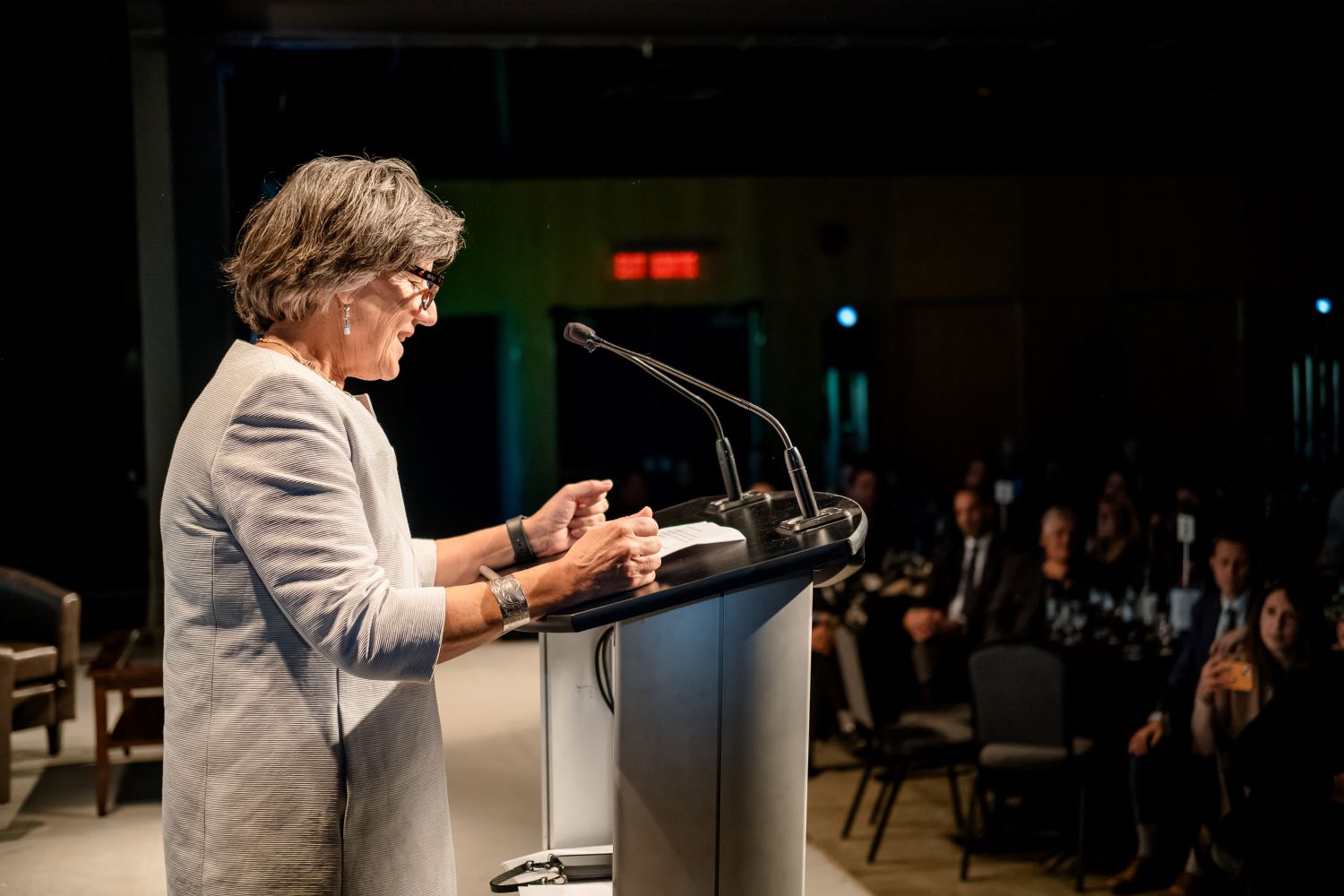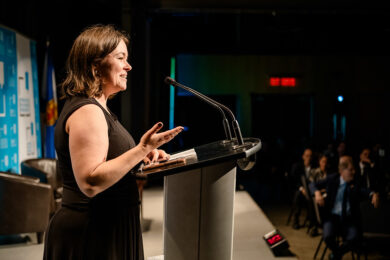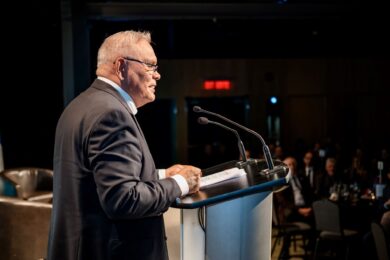
Dr. Anya Waite: ‘It is a time to build new pathways for Canadian research’

Dr. Anya Waite received the 2024 Frank McKenna Award at a ceremony at Pier 21 in Halifax. As CEO of the Ocean Frontier Institute, she is leading an ocean-first approach to the fight against global warming. In her acceptance speech, she talks about the promise of emerging carbon capture technology and the necessary regulation that lies ahead:
Six years ago, when I started to lead the Ocean Frontier Institute, I noticed the immense challenges presented by the gaps in understanding between ocean research and public policy, industry and the public. The very nature of the research enterprise — it’s an exacting field of endeavor, and it generally demands the full focus of those who dare to devote their lives to it. When I mentioned the rich discussions I was having with politicians and policymakers, the reactions from colleagues often ranged from mild interest to sort of a dismissive shrug and a bit of an eye roll, and comments included ‘better you than me’ or ‘what a waste of time,’ and ‘I’m not really interested in politics.’
So, politics. We can describe politics as a dynamic landscape of power and action that we walk through daily, instead of an unnecessary irritant; mapping the political landscape, both small and large becomes a basic necessity to navigate the professional world. We can identify mountains to climb, hidden chasms, traps and places of refuge. And, importantly, all of these places have navigators and gatekeepers. Conversations along the path become a detective story where we identify the best path to pursue and we self-correct. Rounding the corner of an ocean research conference, one can see: here be dragons! And I have to admit, I personally started as a true naif, not knowing what to expect, always optimistic, learning quickly from many, many mistakes.
I’ve been fortunate enough to have some very wise companions on this journey helping me find the right path. Two of these I have pleasure to welcome this evening in the room, John Risley and Catherine Blewett. In 2020, the gap between researchers’ understanding of the ocean’s role in climate change and the understanding of policymakers was a gap hidden in plain sight. And Catherine had just joined OFI as a policy advisor, and she heard scientists reflecting on the fact that the ocean controlled the global climate. This was something that we know, we understand. It absorbs 90 percent of the heat and has taken up 30 percent of the carbon dioxide that humans have emitted. And she turned to me abruptly and said: policymakers are simply not aware of this. And she had identified a chasm that urgently needed a small but mighty bridge to move research knowledge into the policy arena and vice versa.
So we launched the ocean is missing campaign at COP26 in Glasgow, helping shift the dialog with the major governmental system, the UN, and helping trigger the World Meteorological Organization’s creation of something called the Greenhouse Gas Watch. And for the very first time, ocean carbon was included in the climate conversation.
I don’t know if you’re aware, but the first Intergovernmental Panel on Climate Change (IPCC) reports did not have the word “ocean” in them, even though the ocean controls the global climate. We also mapped the ocean climate nexus within Canada, and we discovered that there really isn’t a clear nest for the ocean’s role in climate in the Canadian government system. Our American colleagues are actually advocating for an entirely new government agency just for ocean and climate, and failing this in Canada, we must continue to persevere across multiple agencies — and that’s really a challenge. This urgency grows as new industry is exploding, selling ocean carbon credits by pulling carbon dioxide from the atmosphere and storing it in the ocean.
Carbon dioxide removal, or CDR, is a critical activity to complement decarbonization, and because of its huge storage capacity, the ocean is the most likely place that this carbon can successfully be stored.
In Canada, the industry is actually centered here in Nova Scotia. It is initiated, supported and critiqued by the top-flight ocean research community. We need to effectively regulate this potentially major industry. Right now, there is a big debate happening where we’ve had, over the last week, several conversations with ministers who are trying to formulate a well-focused Canadian policy here, and some of the best discussions we’re having are with the Canadian Senate. And I’m very pleased to share that we’re supporting Nova Scotia Senators Stan Kutcher and Colin Deacon, who have championed a Senate study on marine carbon dioxide removal, which has just been launched at the end of September, and the outcome will be in May 2025, so we’re very, very excited about that.
We’re also discussing the ocean-climate nexus with banks, with insurance companies, with small start-ups and with philanthropy. We’ve learned an enormous amount from John Risley, and he’s opened doors with key stakeholders. I must say, the learning actually seems to go both ways. John had managed to arrange a meeting for us about a month ago with a senior executive of a large Canadian bank, and I didn’t want to focus too much on the oceanography, on how the North Atlantic impacts and controls the global climate. So I was shying away from doing that, but John leapt up to the front of the room and started to lecture the bank leaders on ocean circulation. And we think that John well on his way to earning an honorary doctorate in ocean climate and physics.
I’d like to acknowledge a few people here. First of all, my husband, who has supported me in everything I do.
I’d also like to acknowledge my colleagues here tonight, Khrista Jeffrey and Kim Thomson. Khrista for her steady, steadfast support of my work through thick and thin, and Kim for her visionary guidance through every conceivable administrative swamp. And I’d also like to thank my friends and colleagues who are here tonight. They keep me honest, talk straight, ask questions that I don’t always want to answer, and without them, I would not be here today.
Let’s look to the future. Through excellent ocean research, the Ocean Frontier Institute will continue to champion a future for Nova Scotia with environmentally responsible offshore wind resources, fisheries supported by the very latest genetic and statistical tools, and nimble ocean technology and carbon removal industries. In an internationally competitive landscape, these industries can only be successful if they are working in tune with the best and brightest scientific minds, such as those here in Atlantic Canada. As we look to the future, the Canadian political landscape is changing in ways we do not yet understand. It’s a time to reinvigorate the connection between excellent research, effective policies and a vibrant economy. It is a time to build new pathways for Canadian research. I pledge to work with the Public Policy Forum and with you all to blaze the trail.
Thank you.
This transcript has been edited for length and clarity.





